|
Books Should Be Free Loyal Books Free Public Domain Audiobooks & eBook Downloads |
|
|
Books Should Be Free Loyal Books Free Public Domain Audiobooks & eBook Downloads |
|
Top Authors |
|---|
|
Book type:
Sort by:
|
By: Henry L. Mencken | |
|---|---|
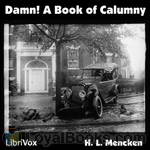 Damn! A Book of Calumny
Damn! A Book of Calumny
Henry Louis “H. L.” Mencken (1880 – 1956) was an American journalist, essayist, magazine editor, satirist, acerbic critic of American life and culture, and a student of American English. Known as the “Sage of Baltimore”, he is regarded as one of the most influential American writers and prose stylists of the first half of the 20th century. Mencken is perhaps best remembered today for The American Language, a multi-volume study of how the English language is spoken in the United States, and for his satirical reporting on the Scopes trial, which he named the “Monkey” trial.” | |
By: Paul Verlaine (1844-1896) | |
|---|---|
 Poems of Paul Verlaine
Poems of Paul Verlaine
| |
By: William Morris (1834 — 1896) | |
|---|---|
 The Wood Beyond the World
The Wood Beyond the World
MANUAL OF SURGERY, OXFORD MEDICAL PUBLICATIONSBY ALEXIS THOMSON, F.R.C.S.Ed.PREFACE TO SIXTH EDITION Much has happened since this Manual was last revised, and many surgical lessons have been learned in the hard school of war. Some may yet have to be unlearned, and others have but little bearing on the problems presented to the civilian surgeon. Save in its broadest principles, the surgery of warfare is a thing apart from the general surgery of civil life, and the exhaustive literature now available on every aspect of it makes it unnecessary that it should receive detailed consideration in a manual for students... | |
 News From Nowhere
News From Nowhere
News from Nowhere (1890) is a classic work combining utopian socialism and soft science fiction written by the artist, designer and socialist pioneer William Morris. In the book, the narrator, William Guest, falls asleep after returning from a meeting of the Socialist League and awakes to find himself in a future society based on common ownership and democratic control of the means of production. In this society there is no private property, no big cities, no authority, no monetary system, no divorce, no courts, no prisons, and no class systems... | |
 The Well at the World's End, Book 1: The Road unto Love
The Well at the World's End, Book 1: The Road unto Love
The Well at World's End is thought to be one of the first examples of an entirely fictional fantasy world, and has greatly influenced later fantasy writers such as C.S. Lewis and J.R.R. Tolkien. The book follows the travels of Ralph, a prince of a tiny country, as he disobeys his fathers wishes and runs away from home to adventure in the world, and seek out the fabled Well at World's End, said to grant eternal youth to those who drink from it. | |
 The House of the Wolfings
The House of the Wolfings
William Morris (1834-1896) was a writer, illustrator and medievalist from the Romantic period and associated with other renowned authors of the time such as Dante Rossetti. His fascination with ancient Germanic and Norse people dominated his writings, the first to be set in an entirely invented fantasy world and which helped to establish the fantasy genre. The House of Wolfings (1890), some argue, is a demonstration of Morris' socialism as the society described, though not an utopia, is clan-based, elects leaders and makes decisions in clan tribal meetings... | |
 The Story of the Volsungs, (Volsunga Saga) With Excerpts from the Poetic Edda
The Story of the Volsungs, (Volsunga Saga) With Excerpts from the Poetic Edda
| |
 The Art and Craft of Printing
The Art and Craft of Printing
| |
 The Tale of Beowulf Sometime King of the Folk of the Weder Geats
The Tale of Beowulf Sometime King of the Folk of the Weder Geats
| |
 The Story of Sigurd the Volsung
The Story of Sigurd the Volsung
| |
 The Hollow Land
The Hollow Land
| |
 Hopes and Fears for Art
Hopes and Fears for Art
| |
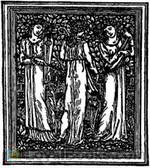 The Earthly Paradise
The Earthly Paradise
| |
 The Water of the Wondrous Isles
The Water of the Wondrous Isles
| |
 The Story of Sigurd the Volsung and the Fall of the Niblungs
The Story of Sigurd the Volsung and the Fall of the Niblungs
| |
 A Dream of John Ball; and, a king's lesson
A Dream of John Ball; and, a king's lesson
| |
 The Story of Grettir the Strong
The Story of Grettir the Strong
| |
 The Roots of the Mountains; Wherein Is Told Somewhat of the Lives of the Men of Burgdale
The Roots of the Mountains; Wherein Is Told Somewhat of the Lives of the Men of Burgdale
| |
 Child Christopher and Goldilind the Fair
Child Christopher and Goldilind the Fair
| |
 The Story of the Glittering Plain; or, the land of Living Men
The Story of the Glittering Plain; or, the land of Living Men
| |
 Old French Romances
Old French Romances
| |
 The World of Romance being Contributions to The Oxford and Cambridge Magazine, 1856
The World of Romance being Contributions to The Oxford and Cambridge Magazine, 1856
| |
 The Sundering Flood
The Sundering Flood
| |
 The Pilgrims of Hope
The Pilgrims of Hope
| |
 A Selection from the Poems of William Morris
A Selection from the Poems of William Morris
| |
 The Tables Turned or, Nupkins Awakened. A Socialist Interlude
The Tables Turned or, Nupkins Awakened. A Socialist Interlude
| |
By: Grace Livingston Hill (1865-1947) | |
|---|---|
 Cloudy Jewel
Cloudy Jewel
Julia Cloud, the oldest--and most responsible--child of her family, helped raise her four siblings due to their mother's long-time illness and father's death. After faithfully nursing two ill brothers (who died), she then cared for her invalid mother for many years. When Julia's mother passes on, her only surviving sibling Ellen fully expects--and nearly demands--that her spinster sister come live with her family. But to earn her keep, Julia must be their live-in housekeeper and babysitter for Ellen's four children. But Julia's college-age niece and nephew arrive unexpectedly from California and offer Aunt Cloudy Jewel a surprise opportunity she never expected in her wildest dreams. | |
 Marcia Schuyler
Marcia Schuyler
A compelling love triangle. Marcia is young & sweet. Her older sister Kate is vain & selfish. Marcia deeply admires the man that Kate is to marry: handsome & respected David Spafford. But on the eve of the wedding, Kate elopes with another man. Marcia is there when the note is found...the note that effectively breaks David's heart. Out of pity for his situation, Marcia offers to take Kate's place, in order to save David from humiliation. She grows in love for him, all the while aware that he's still grieving for his lost Kate. What will happen when Kate returns, fully intending to get David back? Will Marcia have the strength to fight for the man she now loves? | |
 The Girl from Montana
The Girl from Montana
Young Elizabeth, left orphaned by an evildoer who murders her last brother, flees Montana on horseback to find her remaining relatives in the East. Her social and spiritual journey leads her through harrowing encounters, struggles between good and evil, romance and, ultimately, love and fortune. Classic Grace Livingston Hill. (Introduction by Gail Mattern) | |
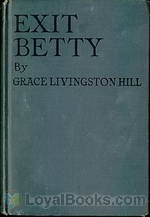 Exit Betty
Exit Betty
| |
 The War Romance of the Salvation Army
The War Romance of the Salvation Army
| |
By: John Wesley Powell (1834-1902) | |
|---|---|
 Canyons of the Colorado, or The exploration of the Colorado River and its Canyons
Canyons of the Colorado, or The exploration of the Colorado River and its Canyons
John Wesley Powell was a pioneer American explorer, ethnologist, and geologist in the 19th Century. In 1869 he set out to explore the Colorado and the Grand Canyon. He gathered nine men, four boats and food for ten months and set out from Green River, Wyoming, on May 24. Passing through dangerous rapids, the group passed down the Green River to its confluence with the Colorado River (then also known as the Grand River upriver from the junction), near present-day Moab, Utah. The expedition’s route... | |
 On Limitations To The Use Of Some Anthropologic Data
On Limitations To The Use Of Some Anthropologic Data
| |
 Wyandot Government: A Short Study of Tribal Society Bureau of American Ethnology
Wyandot Government: A Short Study of Tribal Society Bureau of American Ethnology
| |
By: Ernest William Hornung (1866-1921) | |
|---|---|
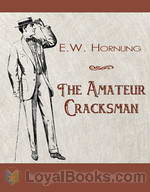 The Amateur Cracksman
The Amateur Cracksman
“I’d tasted blood, and it was all over with me. Why should I work when I could steal? Why settle down to some humdrum uncongenial billet, when excitement, romance, danger and a decent living were all going begging together” – A. J. Raffles, The Ides of March. | |
By: William Clark Russell (1844-1911) | |
|---|---|
 The Frozen Pirate
The Frozen Pirate
Sailing adventure with storms, icebergs, shipwrecks, treasure, and the reawakening of a pirate frozen in suspended animation for nearly fifty years | |
By: Irvin S. Cobb (1876-1944) | |
|---|---|
 Cobb's Anatomy
Cobb's Anatomy
Irvin Shrewsbury Cobb was born on June 23, 1876. At seventeen years of age, he began writing for the Paducah Daily News, his hometown paper. At nineteen he became the managing editor; up to that point, our nation’s youngest. He worked as a columnist, a humorist and an author. But ‘horror,’ and ’short stories,’ are not why he is remembered. He is remembered because he was, and still is, funny. And although he is now dead–he died March 11, 1944–this work “Cobb’s Anatomy,” among others, has left an indelible mark upon mankind: a smile. | |
 One Third Off
One Third Off
Irvin Shrewsbury Cobb (June 23, 1876–March 11, 1944) was an American author, humorist, and columnist who lived in New York and wrote over 60 books and 300 short stories. Cobb has been described as “having a round shape, bushy eyebrows, full lips, and a triple chin. He always had a cigar in his mouth.” This book is a hilarious account of Cobb’s attempts at weight-loss. | |
 J. Poindexter, Colored
J. Poindexter, Colored
This comic novel relates the first-person adventures in New York City of Jefferson Poindexter, personal assistant to Cobb's famous Judge Priest, while the judge is vacationing abroad. (Introduction by Grant Hurlock) | |
By: Alfred Noyes (1880-1958) | |
|---|---|
 Watchers of the Sky
Watchers of the Sky
| |
 Drake
Drake
Alfred Noyes, in the blank-verse epic "Drake", fictionalizes the historical Francis Drake, who, during the reign of Elizabeth I of England, sailed (and plundered) on the Spanish Main and beyond. | |
 The Lord of Misrule And Other Poems
The Lord of Misrule And Other Poems
| |
 Rada A Drama of War in One Act
Rada A Drama of War in One Act
| |
By: Peter Kropotkin (1842-1921) | |
|---|---|
 Mutual Aid: A Factor of Evolution
Mutual Aid: A Factor of Evolution
Mutual Aid: A Factor of Evolution is a book by Peter Kropotkin on the subject of mutual aid, written while he was living in exile in England. It was first published by William Heinemann in London in October 1902. The individual chapters had originally been published in 1890-96 as a series of essays in the British monthly literary magazine, Nineteenth Century. Written partly in response to Social Darwinism and in particular to Thomas H. Huxley’s Nineteenth Century essay, The Struggle for Existence, Kropotkin’s book drew on his experiences in scientific expeditions in Siberia to illustrate the phenomenon of cooperation... | |
 The Conquest of bread
The Conquest of bread
In this work, Kropotkin points out what he considers to be the fallacies of the economic systems of feudalism and capitalism, and how he believes they create poverty and scarcity while promoting privilege. He goes on to propose a more decentralised economic system based on mutual aid and voluntary cooperation, asserting that the tendencies for this kind of organisation already exist, both in evolution and in human society. | |
By: William Dean Howells (1837-1920) | |
|---|---|
 My Mark Twain
My Mark Twain
William Dean Howells (1837-1920) became fast friends with Mark Twain from the moment in 1869 when Twain strode into the office of The Atlantic Monthly in Boston to thank Howells, then its assistant editor, for his favorable review of Innocents Abroad. When Howells became editor a few years later, The Atlantic Monthly began serializing many of Twain’s works, among them his non-fiction masterpiece, Life on the Mississippi. In My Mark Twain, Howells pens a literary memoir that includes such fascinating scenes as their meetings with former president Ulysses Grant who was then writing the classic autobiography that Twain would underwrite in the largest publishing deal until that time... | |
 Indian Summer
Indian Summer
In his novel Indian Summer, William Dean Howells presents a mellow but realistic story that has the complete feel of that delightful time of the year, although the plot actually spans several seasons. The Indian summer aspect applies to a sophisticated gentleman, Theodore Colville, who has just entered his middle years as he returns to a scene, Florence, Italy, that played an important part in his early manhood. It was here twenty years earlier that he first fell in love, seemingly successfully until a sudden and harsh rejection... | |
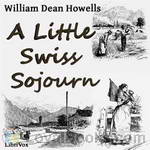 A Little Swiss Sojurn
A Little Swiss Sojurn
A charming brief account of a two months' autumnal stay on the shores of the Lake of Geneva. Howells, who was there with his family traveling from England to Italy, has a sharp eye not only for scenery and architecture, but for people and customs, both Swiss and foreign. | |
 Christmas Every Day and Other Stories Told for Children
Christmas Every Day and Other Stories Told for Children
Five short delightful stories for children, told in the voice of "the papa" to "the girl" and "the boy." William Dean Howells (March 1, 1837 – May 11, 1920) was an American realist author and literary critic. Nicknamed "The Dean of American Letters", he was particularly known for his tenure as editor of the Atlantic Monthly as well as his own prolific writings, including the Christmas story "Christmas Every Day" and the novel The Rise of Silas Lapham. (Reader’s Note for story 3: A pony engine is a small locomotive for switching cars from one track to another.) | |
 Annie Kilburn
Annie Kilburn
After 11 years in Rome, Annie Kilburn returns home to the US after the death of her father. But the home she knew is dramatically changed in many ways. She starts to work with sick children, and finds herself attached to them, and to the minister who helps her, Mr. Peck. | |
 Short Stories and Essays (from Literature and Life)
Short Stories and Essays (from Literature and Life)
| |
 William Dean Howells Works
William Dean Howells Works
| |
 Stories Of Ohio
Stories Of Ohio
| |
 Hazard of New Fortunes
Hazard of New Fortunes
Howell’s novel is set in New York of the late nineteenth century, a city familiar to readers of Edith Wharton and Henry James. Basil March, a businessman from Boston of a literary bent, moves with his family to New York to edit a new journal founded by an acquaintance. Its financial support, however, comes from a Mr. Dryfoos, a Pennsylvania Dutch farmer suddenly become millionaire by the discovery of natural gas on his property, and now living in New York with his family in a style he hopes will befit his new wealth... | |
 Literature and Life (Complete)
Literature and Life (Complete)
| |
 A Modern Instance
A Modern Instance
| |
 Shapes that Haunt the Dusk
Shapes that Haunt the Dusk
| |
 My Literary Passions
My Literary Passions
| |
 Roman Holidays, and Others
Roman Holidays, and Others
| |
 Emile Zola
Emile Zola
| |